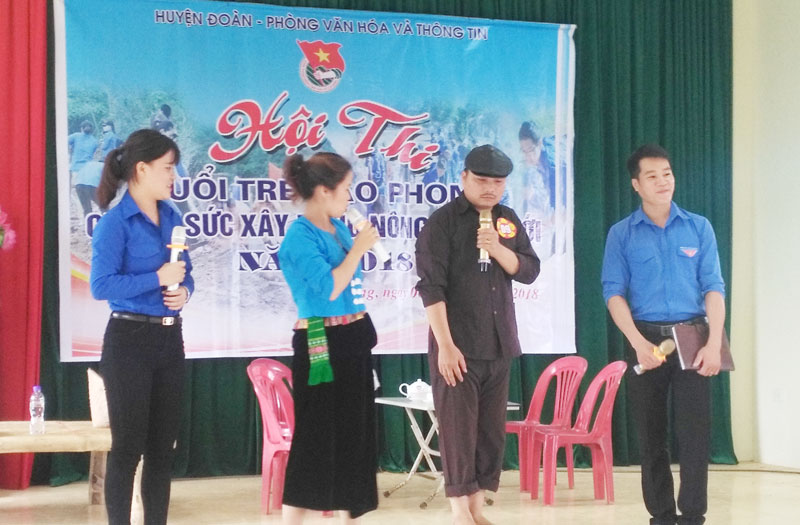
(HBO) – The Ho Chi Minh Communist Youth Union (HCM CYU) chapter in Cao Phong district of the northern mountainous province of Hoa Binh has recently held a contest on "Cao Phong’s youths joining hands in building new-style rural areas in 2018” at the Nam Phong communal People’s Committee, with the participation of 12 teams from HCM CYU units in the district.

A mini-drama on building new-style
rural areas is performed by the Ho Chi Minh Communist Youth Union chapter in Dung
Phong commune.
At the event, participants competed in three events, including
introduction – "we talk about ourselves”, multiple choice questions on general
knowledge and mini-dramas on rural stories.
The contest focused on the dissemination of the Party and State
policies, as well as of the province and district related to the national target
programme on building new-style areas from now to 2020, along with the
participation of HCM CYU’s members, youths and people in the implementation of
the programme.
In addition, it introduced interesting solutions, models and
measures which have been efficiently applied during the communication work and the
implementation of the national target programme in localities and units. Ideas
and measures to mobilise financial sources and people’s strengths for the
successful programme on building of new-style rural areas in the coming time
were also delivered at the contest.
At the end of the contest, the organising board presented the
first prize to the HCM CYU chapter in Dung Phong commune, the second prize to
the chapters in Nam Phong and Tay Phong communes. Meanwhile, three third prizes
and six consolation prizes were handed over to the participating teams./.
With an increasingly vibrant and widespread emulation movement aimed at building cultured residential areas and cultured families, Yen Thuy District has been making steady progress toward improving both the material and spiritual well-being of its people, while fostering a civilized, prosperous, beautiful, and progressive community.
Once lacking recreational spaces and community facilities, Residential Group 2 in Quynh Lam Ward (Hoa Binh City) has recently received attention for the construction of a new, spacious, and fully equipped cultural house. The project followed the model of state support combined with public contributions in both labor and funding.
The "All people unite to build cultural life" movement, which has been effectively integrated with Kim Boi district’s socio-economic development goals, is fostering a lively spirit of emulation across local residential areas, hamlets, villages, public agencies, and enterprises. In addition, through the initiative, traditional cultural values are being preserved and promoted, while community solidarity and mutual support in poverty reduction and economic development are being strengthened.
A working delegation of the Hoa Binh provincial People’s Committee led by its Permanent Vice Chairman Nguyen Van Toan on June 11 inspected the progress of a project to build the Mo Muong Cultural Heritage Conservation Space linked to tourism services in Hop Phong commune, Cao Phong district.
Born and growing in the heroic land of Muong Dong, Dinh Thi Kieu Dung, a resident in Bo town of Kim Boi district, in her childhood was nurtured by the sweet lullabies of her grandmother and mother. These melodies deeply imprinted on her soul, becoming an inseparable part of her love for her ethnic group's culture. For over 20 years, this love for her hometown has driven Dung to research, collect, and pass down the cultural values of the Muong people to future generations.
In the final days of May, the Ethnic Art Troupe of Hoa Binh Province organized performances to serve the people in remote, mountainous, and particularly disadvantaged areas within the province. These were not just ordinary artistic shows, but they were the meaningful journeys aimed at spreading cultural values, enhancing the spiritual life of the people and contributing to the preservation of ethnic minority cultural identities.



